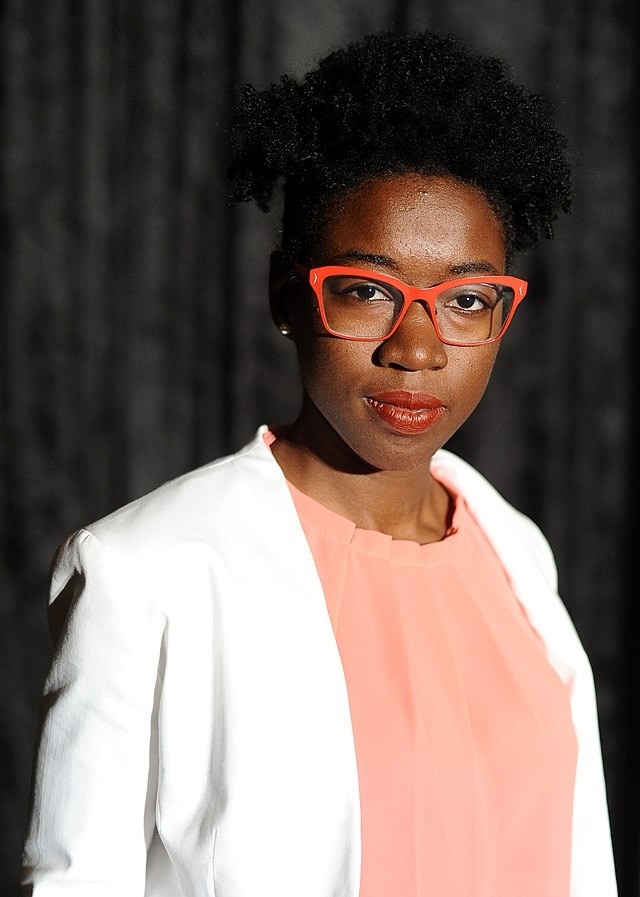Click the picture below to watch a two-minute video about Dr. Joy Buolamwini
 Joy Buolamwini at Wikimania 2018 in Cape Town, South Africa.Niccolò Caranti via Wikimedia Commons
Joy Buolamwini at Wikimania 2018 in Cape Town, South Africa.Niccolò Caranti via Wikimedia Commons
Dr. Joy Buolamwini, born 23 January 1990, is a Canadian American scientist who studies the ways that computers can be unfair to the people who use them. She started a group called the Algorithmic Justice League to make sure that computers and artificial intelligence (AI) can treat people fairly.
Early life and School
Dr. Buolamwini was born in Edmonton, Canada, and grew up in Mississippi, USA. When she was nine years old, she learned about a robot named Kismet, which was created by a scientist called Dr. Cynthia Breazeal at the Massachusetts Institute of Technology (MIT).[1] This made her very excited about computers and technology, so she started teaching herself how to write the code which tells computers what to do.[2]
After finishing high school, she went to the Georgia Institute of Technology to study computer science. She was a top student and was given many special scholarships, including the Stamps President’s Scholarship. Scholarships like this give the best students more chances to keep learning and work with other people in the subjects they choose.
Dr. Buolamwini also traveled to Zambia, where she helped teach young people how to build websites and apps so that they would have the skills needed to work with technology.[3] Later, she went to the University of Oxford in England and earned a master’s degree in education.[4] Then, she studied at MIT and earned more degrees in Media Arts and Sciences, including a PhD in 2022.
How Can Computers Treat People Unfairly?
While doing research, Dr. Buolamwini noticed something strange. She was using a computer program which used a little camera to scan and recognize faces – this is called facial recognition. Whilst using the program, she noticed that it could not detect her face, but it did work on her lighter-skinned classmates.[5]
Facial recognition programs are trained to find faces by people. The people show the computer lots of pictures of faces so that it learns what faces look like. However, if most of the pictures the computer is shown are of people with light skin, the program may not learn what the faces of people with darker skin look like. If a computer is trained to be unfair by the people that train it – even if they do it accidentally – it will treat people unfairly. This is called algorithmic bias.[6]
Algorithmic bias doesn’t just affect facial recognition programs. Different computer programs or AI are also used in many important areas, like deciding who gets jobs or gets to go to certain colleges. If these programs are biased, they can make unfair choices. This harms certain groups of people by not giving them the same opportunities. For example, if AI chooses more white people to get jobs, it means other groups are missing out on those opportunities.
The Algorithmic Justice League
To fix this problem, Dr. Buolamwini started a group called the Algorithmic Justice League in 2016. This group is trying to make sure that the people training computer programs and AI are training them to be fair. They also want to make more people aware that these programs can be unfair. As well as this, the Algorithmic Justice League help people who have been treated unfairly by these programs and push for new rules to stop this from happening in the future.[7]
Unmasking AI: My Mission to Protect What Is Human in a World of Machines
In 2023, Dr. Buolamwini wrote a book called Unmasking AI: My Mission to Protect What Is Human in a World of Machines. In her book, she explains exactly how computers can be unfair and why it is important to make sure technology treats everyone equally. She also talks about how computer programs or AI should not be used to make decisions that hurt certain groups of people or take people’s work.
Dr. Buolamwini is helping to make computer programs and AI fair for everyone!
Joy Buolamwini by Abbigail Mira
Joy Buolamwini, a short documentary by Ascot Avenue Elementary School student Abbigail Mira, was a finalist at the 20th Annual MY HERO International Film Festival. The film was created as part of the MY HERO Media Arts Education program at Ascot Elementary in Los Angeles.
Watch Abbigail’s film here.
Read more about the MY HERO Media Arts Education program here.
About the MY HERO International Film Festival:
The My Hero Film Festival is an annual event dedicated to showcasing films that celebrate the power of the human spirit. The festival provides a platform for filmmakers to share inspirational stories of everyday heroes. Thanks to generous sponsors, prizes are awarded to elementary, middle school, high school, college and professionals in a variety of categories including documentary, narrative, music video, animation, experimental, and more.
The festival aims to inspire audiences to recognize the heroism in their own lives and encourage positive actions in their communities. Learn more.
[1] Cohen, Arianne. The Digital Activist Taking Human Prejudice Out of Our Machines. [Online] Available https://www.bloomberg.com/news/articles/2017-06-26/the-digital-activist-taking-human-prejudice-out-of-our-machines. 2017.
[2] Zamrize Media. Joy Buolamwini | Fulbright Fellow 2013 | Zambia. [Online] Available https://www.youtube.com/watch?v=usWTUBFEJkk. 2013.
[3] Zamrize Media, 2013.
[4] https://www.rhodeshouse.ox.ac.uk/scholarships/the-rhodes-scholarship/
[5] TED. How I'm fighting bias in algorithms | Joy Buolamwini. [Online] Available https://www.youtube.com/watch?v=UG_X_7g63rY. 2017.
[6] Ibid.
[7] Super Data Science: ML & AI Podcast with Jon Krohn. What is the Algorithmic Justice League? [Online] Available https://www.youtube.com/watch?v=Bmjt0QW3T7g. 2023.
Page created on 1/31/2025 11:57:53 PM
Last edited 10/23/2025 6:02:49 PM
